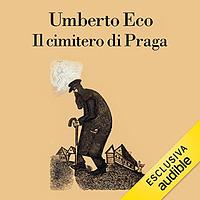Take a photo of a barcode or cover
This book was something.
It is expertly researched and crafted. It jumps back and forth in time so much that the author included a breakdown of what happened when at the end of the Kindle copy I read. The prose, at least in translation, flowed well and evoked people and scenes in larger than life detail.
BUT! The plot centers around "The Protocol", a paper that purports to be a record of a meeting of influential Jews who plotted to control the world. In this story, a fictional forger is tasked with forging this document - and most of the rest of the cast are real people, who acted as they did in real life outside of these fictional interactions. This main protagonist is vehemently anti-Semitic. It was painful to read. I almost threw my Kindle early on when he rants on about how they are vile and evil and set out to control the world for half a chapter. Half a chapter. Then later he is shown to be a racist in his comments regarding "the Negro race". It has been a long time since I hated a protagonist this much.
I think I am glad that I read it? I doubt I will read it again. I do look forward to reading the author's The Name of the Rose, which I have heard is quite good.
It is expertly researched and crafted. It jumps back and forth in time so much that the author included a breakdown of what happened when at the end of the Kindle copy I read. The prose, at least in translation, flowed well and evoked people and scenes in larger than life detail.
BUT! The plot centers around "The Protocol", a paper that purports to be a record of a meeting of influential Jews who plotted to control the world. In this story, a fictional forger is tasked with forging this document - and most of the rest of the cast are real people, who acted as they did in real life outside of these fictional interactions. This main protagonist is vehemently anti-Semitic. It was painful to read. I almost threw my Kindle early on when he rants on about how they are vile and evil and set out to control the world for half a chapter. Half a chapter. Then later he is shown to be a racist in his comments regarding "the Negro race". It has been a long time since I hated a protagonist this much.
I think I am glad that I read it? I doubt I will read it again. I do look forward to reading the author's The Name of the Rose, which I have heard is quite good.
adventurous
challenging
dark
mysterious
reflective
tense
medium-paced
Plot or Character Driven:
Character
Strong character development:
No
Loveable characters:
No
Diverse cast of characters:
No
Flaws of characters a main focus:
Complicated
Abandoned. Too slow and rambling. If there is a plot, I missed it.
adventurous
fast-paced
Plot or Character Driven:
A mix
Strong character development:
No
Loveable characters:
Complicated
Diverse cast of characters:
No
Flaws of characters a main focus:
Yes
challenging
dark
emotional
informative
reflective
sad
slow-paced
Plot or Character Driven:
A mix
Strong character development:
Complicated
Loveable characters:
Complicated
Diverse cast of characters:
Complicated
Flaws of characters a main focus:
Yes
I love the historical nature of Eco's books and their veiled mysticism; however, any book that has an explanatory note at the end discussing why the reader might find the book confusing and not entirely enjoyable is probably a little confusing and not entirely enjoyable. It started with some fabulous passages and sections about religion and then diverged into an average and jumbled read. Ultimately just an average book.
challenging
dark
emotional
reflective
slow-paced
Plot or Character Driven:
Character
Strong character development:
Complicated
Loveable characters:
No
Diverse cast of characters:
No
Flaws of characters a main focus:
Yes
Let's get one thing clear: Umberto Eco is a brilliant writer and a master storyteller. I wish that I had read this book in its original Italian, because that would probably have been just an awesome experience from a literary perspective.
What made this book only three stars for me was a combination of its denseness and the extreme amounts of anti-Semitism. I KNOW that it's a book about how the Protocols of the Elders of Zion were written, and I understand that Eco is trying to shine a light on that period of time in order to comment upon it--which I think is effective, and exposing that madness is important--but still. For someone whose religious and cultural heritage is as important as it is to me, this book is a bit hard to stomach. Reading that much "Jews are gross and terrible in literally every way" sentiment is just a lot. I know that Simonini, the main character, is not supposed to be a sympathetic protagonist, and reading his exploits were interesting, but it was hard for me to even appreciate or follow his character because of the vitriol that he spews from page one.
The other issue was, as I said above, the denseness; the book starts off a little slow and Eco's paragraphs are, sometimes, very long and detail-oriented. Again, I think this is where reading it in the original Italian (which is syntactically different enough from English for their sentence structure to make a real difference) would have been easier. I think perhaps it would've been better if I had read another book by Eco first, then tackled The Prague Cemetery.
Overall, not a bad read at all, and a story that you want to see through to its conclusion. It's just hard to get through at times, and that took away from the good parts of the book and the writing.
What made this book only three stars for me was a combination of its denseness and the extreme amounts of anti-Semitism. I KNOW that it's a book about how the Protocols of the Elders of Zion were written, and I understand that Eco is trying to shine a light on that period of time in order to comment upon it--which I think is effective, and exposing that madness is important--but still. For someone whose religious and cultural heritage is as important as it is to me, this book is a bit hard to stomach. Reading that much "Jews are gross and terrible in literally every way" sentiment is just a lot. I know that Simonini, the main character, is not supposed to be a sympathetic protagonist, and reading his exploits were interesting, but it was hard for me to even appreciate or follow his character because of the vitriol that he spews from page one.
The other issue was, as I said above, the denseness; the book starts off a little slow and Eco's paragraphs are, sometimes, very long and detail-oriented. Again, I think this is where reading it in the original Italian (which is syntactically different enough from English for their sentence structure to make a real difference) would have been easier. I think perhaps it would've been better if I had read another book by Eco first, then tackled The Prague Cemetery.
Overall, not a bad read at all, and a story that you want to see through to its conclusion. It's just hard to get through at times, and that took away from the good parts of the book and the writing.
Thxs for the loan w. Really looking forward to reading it





